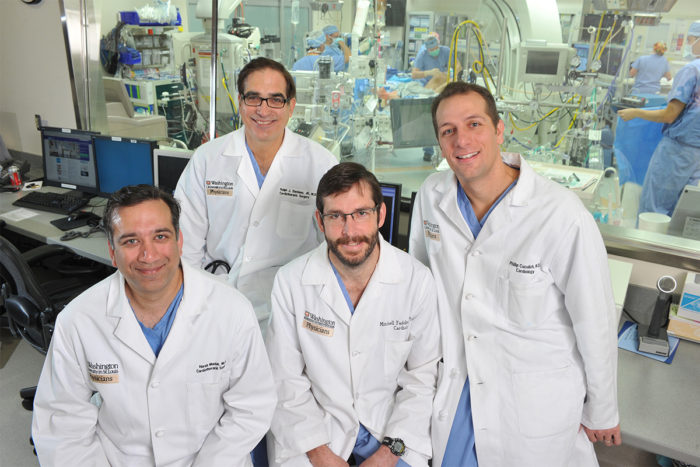Approaching irregular heartbeats from two directions
Doctors at Washington University have developed a new hybrid procedure that blocks misfiring electrical signals that cause irregular heartbeats

Pioneers in surgical techniques for treating atrial fibrillation, from left: Hersh Maniar, MD, Ralph Damiano Jr., MD, Mitchell Faddis, MD, PhD and Phillip Cuculich, MD.
A new hybrid procedure for preventing irregular heartbeats, or atrial fibrillation (AF), combines surgery with a less invasive catheter-based treatment. The treatment, called ablation, applies scars to the heart’s inner surface to block signals that were causing the heart to misfire. The procedure is designed for patients with AF who do not respond to medication. These patients are at high risk for AF recurrence. The hybrid approach was developed by Washington University cardiac surgeons, Ralph Damiano Jr., MD, and Hersh Maniar, MD, with electrophysiologists Phillip Cuculich, MD, and Mitchell Faddis, MD, PhD.
The procedure begins with a minimally invasive approach that involves applying the initial ablation in the form of burns to the heart’s outer surface. On the outside, the burns from the ablation surround the pulmonary veins, where the erratic signals that cause AF often originate. Then, the electrophysiologist threads catheters inside the heart to perform ablations on the inner surface to further contain the signals and to test the integrity of the ablation lines. Both a cardiac surgeon and electrophysiologist are involved in the procedure.
Less risk, shorter recovery
The goal of this collaborative effort is to replicate the excellent long-term success of the Cox-Maze IV procedure, a more invasive version of this new procedure,with less risk and shorter recovery times.
Added advantages include avoiding heart bypass, minimizing risk to surrounding tissues, reducing recurrences of AF, and reducing stroke risk.
Researchers are planning a randomized clinical trial to compare the new hybrid procedure to standard catheter ablation in patients whose atrial fibrillation is symptomatic and persistent and whose left atrium is enlarged. Patients will be followed for 12 months post-procedure. Outside the clinical trial, the hybrid procedure is now available to any patient with atrial fibrillation after consultation with his or her doctor.






